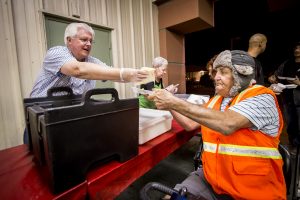By Joyce Coronel
Judi Messer can’t look away when she sees a homeless person begging for help. The former cardiac care nurse has devoted the last 17 years of her life to helping the men, women and children in the Valley who have no place to call home. Messer knows they need help with the basics — things most people take for granted — so she developed the “Hands of Hope” project. The East Valley resident gathers supplies such as socks, bottles of water, lip balm, nail clippers and granola bars and packs them into plastic, zipper-seal bags she keeps in her car to hand out. She’s also put together hundreds of kits that people can distribute. And though Messer is just one person trying to make a difference, she’s not alone. The Arizona Coalition to End Homelessness was formed in the 1990s after advocates realized there was a need to coordinate efforts around the state in support of some of the poorest of Arizona’s poor. Rebecca Pringle, communications manager for ACEH, said the group is working to end homelessness through coordination, education and advocacy. “We believe the best way to end homelessness is to prevent homelessness,” Pringle said. ACEH does not provide direct services but instead advocates on behalf of member organizations at the state legislature.
Some 51 organizations belong to the organization. One of them is Maggie’s Place, a network of homes for expectant mothers who would otherwise be homeless. Arizona has three Maggie’s Place homes; one of them, Elizabeth House, is located in Tempe. Women can join the Maggie’s Place community at any point in their pregnancy and stay until their child is at least six months old. Many of the guests come from difficult circumstances, such as domestic violence, drug abuse, lack of work experience, mental illness and low self worth. Over 650 women have benefitted from the Maggie’s Place homes since the organization was founded in 1999. Kylie, who lived at Elizabeth House in 2006, had nowhere else to turn when she got pregnant. After giving birth to Brianne, a baby girl, the two remained at the home for three months. Counseling, mentoring and emotional support are just some of the benefits guests receive. “I don’t know where I would be if it weren’t for Maggie’s Place,” Kylie wrote of the experience on the organization’s website. “Maggie’s Place was a lifeline for me.” Kylie has since been able to finish school and now works as a medical biller and coder for a behavioral health company.

They can like us and follow us on Facebook. There’s so much to learn,” Pringle said. For $50, membership supports the work of ACEH to advocate on behalf of the homeless at the state and local level. On any given night in Arizona, as many as 27,000 people are homeless. Poverty, domestic violence, chronic health conditions, mental health issues and substance abuse are some of the factors that contribute to homelessness. A lack of support systems and affordable housing are other forces that drive the problem. “There’s a huge need out there,” Pringle said. The ACEH website lists the dozens of organizations that are part of the coalition, and donating funds, goods and services to these member agencies is another good way to help.
Volunteers are still needed to staff an April 6 and 7 phone bank in honor of Arizona Gives Day. ACEH is hoping to make some 5,000 calls seeking donations and will need willing participants with cell phones to make calls from the organization’s Phoenix headquarters. “It will be fun,” Pringle said of the upcoming effort. “You watch the numbers go up.” To volunteer for the ACEH phone bank or to make a contribution, visit ACEH.org or call 602- 340-9393.

